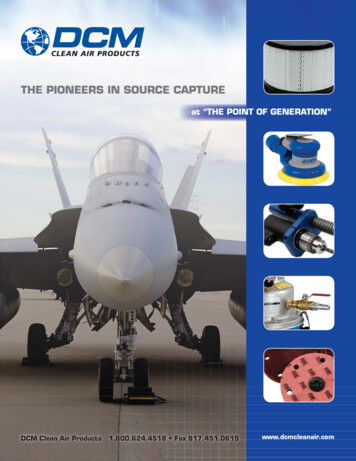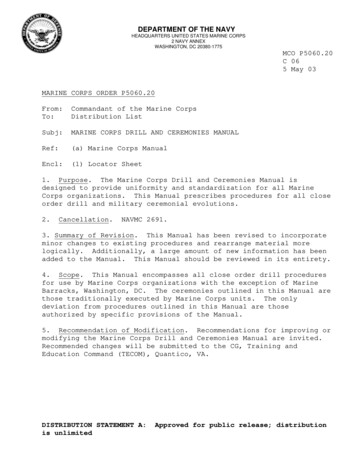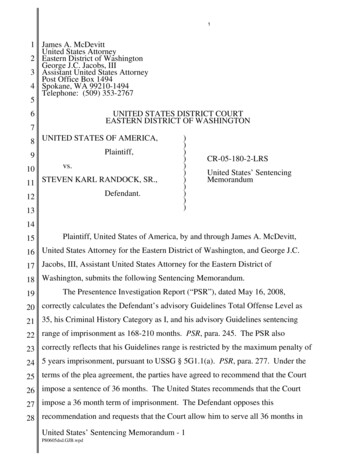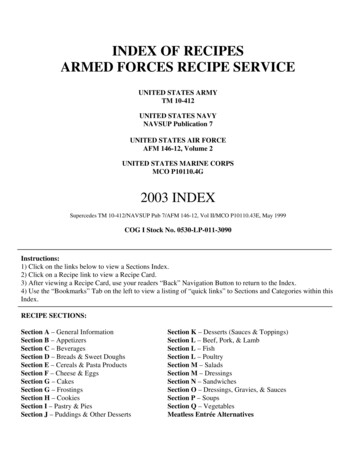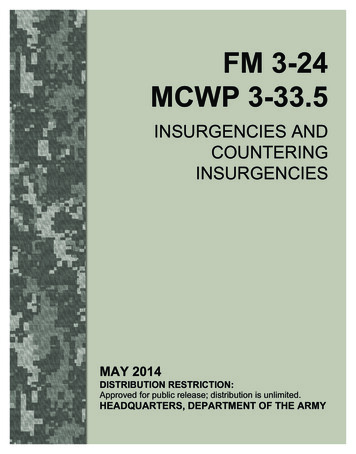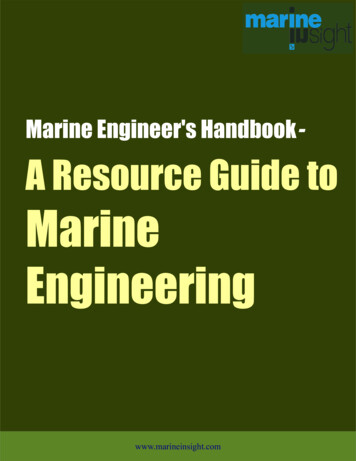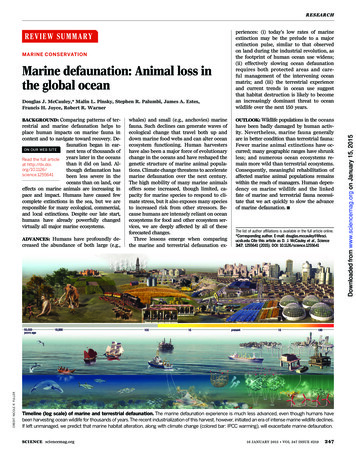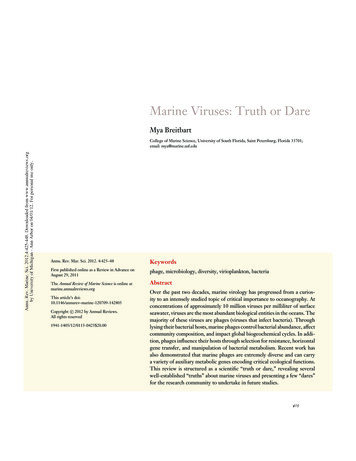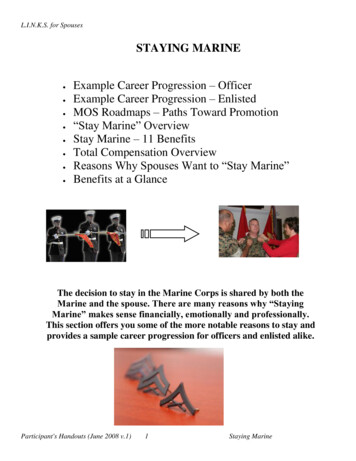
Transcription
L.I.N.K.S. for SpousesSTAYING MARINEExample Career Progression – OfficerExample Career Progression – EnlistedMOS Roadmaps – Paths Toward Promotion“Stay Marine” OverviewStay Marine – 11 BenefitsTotal Compensation OverviewReasons Why Spouses Want to “Stay Marine”Benefits at a GlanceThe decision to stay in the Marine Corps is shared by both theMarine and the spouse. There are many reasons why “StayingMarine” makes sense financially, emotionally and professionally.This section offers you some of the more notable reasons to stay andprovides a sample career progression for officers and enlisted alike.Participant's Handouts (June 2008 v.1)1Staying Marine
L.I.N.K.S. for SpousesParticipant's Handouts (June 2008 v.1)2Staying Marine
L.I.N.K.S. for SpousesThe MOS Roadmap - a path towards promotionWhat is an MOS Roadmap?MOS Roadmaps are just what the name implies a roadmapthrough the Marine Corps Training and Education Continuumfrom Private to Master Gunnery Sergeant - a roadmap to successin the Marine Corps.MOS RoadmapsSuccessful leadership is the key to combat readiness and will always require a high degreeof technical skill, professional knowledge, and intellectual development. Marines achievesuperiority in all three through a combination of MOS skill training, professional militaryeducation, and pursuit of off-duty, voluntary education. It is not always clear, however,when, where and how to optimize each. To assist Marines, the Marine Corps' Training andEducation Centers of Excellence and other agencies have developed MOS Roadmaps.Do Marines have to follow the Roadmap?Yes and no. The MOS Roadmap includes the three areas encompassed by the Continuum:MOS and other skill training, Professional Military Education, and Voluntary Education.Some training and education is mandatory (Recruit Training, MCT, MOS School, etc .).Some may be directed by your chain of command (Operator or Safety courses), and theremainder is voluntary (MCI, MarineNet, college courses, etc.). Marines are advised to seekout mentors, including their OIC, SNCOIC, and unit Career Planner, and to make use of theBase Education office’s vast resources. All are uniquely qualified to help you along the way.Remember, MOS Roadmaps are a guide, but as always, there are several ways to get whereyou want to go.Where can you FIND ALL THE MOS ROADMAPS?Log on to http://www.tecom.usmc.mil/g3/roadmap.php to view additional ground andaviation roadmaps.Participant's Handouts (June 2008 v.1)3Staying Marine
L.I.N.K.S. for Spouses0311 INFANTRY RIFLEMANPRIVATE-PRIVATE FIRST CLASS-LANCE CORPORALSKILL TRAININGREQUIRED SKILL TRAININGCourse Title- Recruit TrainingCourse LocationParris Island, SCSan Diego, CACamp Lejeune, NCCamp Pendleton, CACIDM068083M088085M030314M100312ACE IDMC-2204-0088RECOMMENDED SKILL TRAININGCourse TitleCourse LocationCIDACE ID- Complete certification asGray Belt in the Marine CorpsMartial Arts ProgramUnit- Infantry Rifleman CourseMC-2204-0051N/AN/ARECOMMENDED BILLET ASSIGNMENTS- Assigned to an Infantry Rifle Company or an LAR Company as a rifleman, assistant automatic rifleman, automatic rifleman,assistant fire team leader, scout/grenadier, or scout/rifleman.SPECIAL DUTY ASSIGNMENTS (MCO P1326.6D)Marine Security Guard-8151 (Lance Corporal)Marine Corps Security Force Guard-8152 (Lance Corporal)Marine Corps Security Force Close Quarters Battle Team-8154 (Lance Corporal)PROFESSIONAL MILITARY EDUCATIONREQUIRED PME-INCLUDING MCI (REF: MCO P1553.4) Currently there is no Required PME for LCpl and below.RECOMMENDED PME: 0033/34/35-Fundamentals of Marine Corps LeadershipPROFESSIONAL READING. Privates through Lance Corporal are expected to read and discuss with fellow Marines, each of thefollowing books, before advancing to Corporal.A Message To Garcia, HubbardRifleman Dodd, ForesterThe Killer Angles, ShaaraU.S. ConstitutionBlackhawk Down, BowdenThe Defense of Duffer’s Drift, SwintonThe Soldier’s Load, MarshallVOLUNTARY EDUCATIONRECOMMENDED MOS-RELATED DISTANCE LEARNING COURSESCourse TitleCourse NumberACE Identifier- Infantry Squad Leader: Squad TacticsMCI 0383AMC-2204-0100- Infantry PatrollingMCI 0335CMC-2204-0136RECOMMENDED GENERAL MILITARY DISTANCE LEARNING COURSESThe following MCI courses are recommended for all ranks:0055 - Hazardous Material/ Hazardous Waste Marine0112C - Counseling for Marines0118K – Spelling3420E/25A/26A - Personal Financial Management 0131H - Correspondence Procedures0210B/14A/15A - Terrorism Awareness for Marines028B - Introduction to Combat Intelligence0324G - Operations Against Guerrilla Units0354B - Desert Operations047D - Introduction to Amphibious Embarkation1334H - Math for MarinesParticipant's Handouts (June 2008 v.1)4Staying Marine
L.I.N.K.S. for Spouses2525A - Communications Security0119H – Punctuation0416A - The Marine Corps Publication and Directives System3316E - Basic NutritionThese courses are recommended for specific ranks but any MOS:Private through Lance Corporal: 2538A – Single Channel Ground Airborne Radio System (AN/PRC-119)Private through Sergeant: 0370B – The Marine Rifleman: Combat SkillsPrivate through Sergeant: 0372A – The Marine Rifleman: WeaponsPrivate through Staff Sergeant: 2526B – Introduction to Electronic WarfarePrivate through Gunnery Sergeant: 0381C – Land NavigationLance Corporal through Sergeant: 001A-The Principles of Instruction for the Marine NCOCOLLEGE COURSES AND DEGREES (See Voluntary Education Information).0311 CORPORAL-SERGEANTSKILL TRAININGREQUIRED SKILL TRAININGCourse Title- Infantry Squad Leader CourseRECOMMENDED SKILL TRAININGCourse Title- Martial Arts Instructor CourseCourse LocationCIDACE IDCamp Lejeune, NCCamp Pendleton, CAM03M3X4M10M3X2MC-2204-0122MC-2204-0121Course LocationCamp Lejeune, NCCamp Pendleton, CACIDN/AN/AACE IDMC-1406-0048- Complete certification as aGreen Belt in the Marine CorpsMartial Arts ProgramUnitN/AN/ARECOMMENDED BILLET ASSIGNMENTS(Corporals) Assigned to an Infantry Rifle Company or an LAR Company as a fire team leader/grenadier or a scout team leader.(Sergeants) Assigned to an Infantry Rifle Company or an LAR Company as a platoon guide, squad leader, or scout team leader.SPECIAL DUTY ASSIGNMENTS (MCO P1326.6D)Marine Security Guard-8151Marine Corps Security Force Guard-8152Marine Corps Security Force Cadre Trainer-8153Marine Corps Security Force Close Quarters Battle Team-8154Recruiting Duty-8411 (Corporals require MMEA-85 waiver)Drill Instructor-8511 (Sergeants)Marine Corps Combat Training Instructor-8513Marines in the rank of Sergeant and above with a minimum of 8 but not more than 16 years of active naval service, may apply for thetechnical Warrant Officer program. See SECNAVINST 1120.11A for details.PROFESSIONAL MILITARY EDUCATIONREQUIRED PME-INCLUDING MCI (REF: MCO P1553.4)MCI 0033/34/35-Fundamentals of Marine Corps Leadership (Corporals)MCI 8010-Sergeants’ Distance Education Program (Sergeants)RECOMMENDED PME (REF: MCO P1553.4)Command-Sponsored Corporal’s Course (Corporals)8010-Sergeants’ Distance Education Program (Corporals)Resident SNCO Academy Sergeants Course (Must complete 8010-Sergeants’ Distance Education Program first.)8100-SNCO Career Distance Education Program (Sergeants, who must complete 8010-Sergeants’ Distance Education Program andSNCO Academy Sergeants’ Course first)Participant's Handouts (June 2008 v.1)5Staying Marine
L.I.N.K.S. for SpousesPROFESSIONAL READING. Corporals and Sergeants are expected to read and discuss with fellow Marines each of the followingbooks before advancing to Staff Sergeant.Battle Leadership, Von SchellFlags of Our Fathers, BradleyThe Bridge at Dong Ha, MillerThe Red Badge of Courage, CraneWith the Old Breed at Pelelieu and Okinawa, SledgeFields of Fire, WebbGates of Fire, PressfieldThe Last Full measure, ShaaraTip of the Spear, MichaelsThe United States Marines: A History, SimmonsVOLUNTARY EDUCATIONRECOMMENDED MOS-RELATED DISTANCE LEARNING COURSESCourse TitleCourse NumberInfantry Squad Leader:- Combat LeadershipMCI 0380 (Also offered on MarineNet)- Infantry Squad Leader:MCI 0382 (Also offered on MarineNet)Weapons and fire support- Basic Forward Observation ProceduresMCI 0861 (Also offered on MarineNet)- Military operations on Urban TerrainMCI 0366B (Also offered on MarineNet)ACE 606-0006RECOMMENDED GENERAL MILITARY DISTANCE LEARNING COURSESThese courses are recommended for any MOS:Private through Sergeant: 0370B – The Marine Rifleman: Combat Skills (also offered on MarineNet)Private through Sergeant: 0372A – The Marine Rifleman: Weapons (also offered on MarineNet)Private through Staff Sergeant: 2526B – Introduction to Electronic WarfarePrivate through Gunnery Sergeant: 0381C – Land Navigation (also offered on MarineNet as a Web Course)Lance Corporal through Sergeant: 001A-The Principles of Instruction for the Marine NCOCorporal through Staff Sergeant: 0302AO – Base/Perimeter Defense (Army) this course is only offered on MarineNet as a WebCourse Corporal through Staff Sergeant: 0301AO – Conduct Presence Patrols (Army) this course is only offered on MarineNet as aWeb Course Corporal through Master Gunnery Sergeant: 0201-Intelligence Brief: Southwest AsiaCOLLEGE COURSES AND DEGREESParticipant's Handouts (June 2008 v.1)6Staying Marine
L.I.N.K.S. for SpousesInfantry Billet ProgressionBattalion Operations ChiefWeapons Company Operations ChiefMOS 0369 MSgt - MGySgtRifle Company Gunnery SergeantLAR Company Gunnery SergeantWeapons Platoon SergeantHeavy Machinegun Platoon SergeantAnti-Armor Platoon SergeantRifle Platoon SergeantLAR Platoon SergeantLAR Battalion Master GunnerMachinegun Section LeaderLWCMS Mortar Section Leader81mm Mortar Section Leader (Weapons or LAR Company)Javelin Section LeaderAnti-Tank Section Leader (Weapons or LAR Company)0369 SSgt - GySgtFire Team Leader,Platoon Guide, orSquad Leader; orScout Team Leader0311 Cpl - SgtRifleman, AutomaticRifleman, orAsst. AutomaticRifleman; or AsstTeam Leader,Scout/Grenadier, orScout/Rifleman0311 Pvt - LCplLAV-25 Commander/Master Gunner, LAV-lSection Leader, SquadLeader LAV-25Gunner, AssistantSquad Leader/ Gunner,or Master Gunner’sAssistant, MasterGunner0313 Cpl - SgtMachinegun Team orSquad Leader; orHeavy MachinegunSquad or SectionLeaderMortar Gunner, SquadLeader, Plotter,Plotter/Recorder,Forward Observer; orLAV MortarSection/Squad Leader,Mortarman/FDC NCOAssault SquadLeader, AssaultSection Leader, orSMAW Gunner; orJavelin Gunner,Team Leader, orSquad LeaderTOW Gunner orAnti-Tank SquadLeader; or LAV-ATCommander0331 Cpl - Sgt0341 Cpl - Sgt0351 Cpl - Sgt0352 Cpl - SgtLAV-25 driver orgunner, LAV-C2 driveror gunner, LAV-Ldriver, LAV-Lcrewman, LAV-ATdriver, LAV-ADdriver, LAV-R driver,LAV-MEWS driver, orLAV-M driver.0313 Pvt - LCplMachinegun Gunneror Ammunition Man;Heavy MachinegunGunner, Asst.Gunner, orAmmunition ManMortar AssistantGunner, AmmunitionMan,Loader/AmmunitionMan, or Mortarman/ComputerAssault TeamLeader, SMAWGunner, or SMAWAsst. Gunner; orJavelin AssistantGunnerAsst. TOW Gunneror Loader0331 Pvt - LCpl0341 Pvt - LCpl0351 Pvt - LCpl0352 Pvt - LCplBasic MarinePvt - LCplParticipant's Handouts (June 2008 v.1)7Staying Marine
L.I.N.K.S. for SpousesInfantry Skills Training Progression(MOS Progression)Infantry Operations Chief CourseMOS 0369MSgt and MGySgtInfantry Unit Leader EPMET CourseLight Armored Vehicle Leader Course (If Assigned to an LAR Company)MOS 0369SSgtInfantry SquadLeader CourseLight ArmoredVehicle LeadersCourseInfantryMachinegunLeader CourseInfantry MortarLeader CourseInfantry AssaultmanLeader Course(In Development)Infantry Anti-TankMissileman LeaderCourse(In Development)MOS 0311Cpl and SgtMOS 0313SgtMOS 0331Cpl and SgtMOS 0341Cpl and SgtMOS 0351Cpl and SgtMOS 0352Cpl and SgtInfantryRifleman CourseLight ArmoredVehicle Tank GuidedMissileman CourseMOS 0311Pvt - LCplMOS 0313Pvt - LCplMOS 0331Pvt - LCplMOS 0341Pvt - LCplMOS 0351Pvt - LCplMOS 0352Pvt - LCplMarineRecruit TrainingPvt - LCplParticipant's Handouts (June 2008 v.1)8Staying Marine
L.I.N.K.S. for SpousesInfantry Formal Professional MilitaryEducation Career ProgressionMaster Gunnery Sergeant Regional SeminarMGySgtMaster Sergeant Regional SeminarMSgtSNCO Advanced CourseSNCO Advanced Distance Education Program, MCI 8200Warfighting Skills Program, MCI 7400GySgtInfantry Unit Leader EPMET CourseSNCO Career Distance Education Program, MCI 7100SSgtSergeant’s CourseSergeant’s Distance Education Program, MCI 8010SgtCorporal’s CourseCplFundamentals of Marine Corps Leadership MCI 0033Personal Finance MCI 3420EPvt - LCplMarine Recruit TrainingPvt - LCplParticipant's Handouts (June 2008 v.1)9Staying Marine
L.I.N.K.S. for SpousesALL RANKSVOLUNTARY EDUCATIONRECOMMENDED MOS-RELATED ASSOCIATES DEGREE Associates Degrees generally require approximately60 semester hours of credit. Most colleges will allow you to transfer about 30 semester hours from your military training(formal schools, military experience, MCIs, etc.). However, you will also be required to take a minimum of 30 semesterhours in the “Arts and Sciences” (e.g., English Comp, College Math, Speech, Technical Writing, Psychology, andHistory). There are several programs of study that are closely related to the field of logistics. Two of which are “GlobalLogistics Technology” and “Distribution, Logistics, and Materials Management”. Consult your Base Education Office fora listing of local and distance learning colleges that provide these degree programs.RECOMMENDED MOS-RELATED BACCALAURATE DEGREE or Bachelor’s Degrees, require approximately120 semester hour credits depending on the college you are applying with. Many Marines can complete this type ofdegree (part-time) in less than 8 years.RECOMMENDED TYPES OF MOS-RELATED COLLEGE LEVEL COURSESIntro to LogisticsTraffic ManagementTransportation LogisticsPurchasing LogisticsSupply Chain ManagementAdvanced Global LogisticsRECOMMENDED NON-MOS AND AREA-STUDIES/PROFESSIONAL DEVELOPMENT COLLEGE-LEVELCOURSESExpository WritingU.S. Military HistoryArgument-based ResearchMicrosoft Applications CourseLiterature-based ResearchWestern Civilization 1Professional Research and ReportingGeneral PsychologyAmerican Literature 1General BiologyLiterature of the Theater (or other Drama Course)College AlgebraInterpersonal Speaking (or other Speech/Comm Course)CalculusHumanitiesGeneral ChemistryGeneral AnthropologyAmerican GovernmentGENERAL INFORMATION ON VOLUNTARY EDUCATIONMARINE CORPS CAREER COLLEGE PROGRAM Today's Marines are taking advantage in ever increasingnumbers of academic degree programs offered by Serviceman’s Opportunity College – Marine (SOCMAR) memberschools. The Marine Corps Career College Program (MCCCP) expands the range of educational opportunities availablefor Marines who would like to apply their military training and workplace skills and experience toward completion of anoccupational specialty-related college degree. The goal is to encourage Marines to attain the same level of careerdevelopment and professional recognition as their counterparts in their sister services and civilian society.How MCCCP Works. The goal of the program is to support the Marine's career and personal development by providingcomprehensive degree plans and roadmaps which maximize the credit which member schools will award for MarineCorps training and experience.Each of the selected Marine Occupational Fields has been matched with existing SOCMAR Degree Networks,member institutions and degree/certificate program curriculums. Participating SOCMAR Career Network schoolsare committed to awarding college credit based on American Council on Education recommendations for militaryservice school courses, Marine workplace experience, the Marine Corps Institute, credit by examinationprograms, and professional/occupational certification examination programs, where applicable to degreerequirements.Marine Corps Career Degrees incorporate the Guaranteed Transferability provisions of the SOC/SOCMAR system.Participant's Handouts (June 2008 v.1)10Staying Marine
L.I.N.K.S. for SpousesThe MCCP Program will be briefed to Marines at all MOS-awarding formal schools and MOS advanced courses.MCCCP MOS-related curriculum offerings - SOCMAR Career College Degree Roadmaps - are summarized onthe SOC website, and displayed on the MCCCP member websites.To qualify for college-level credit for Marine training and experience, the Marine must enroll in a SOCMAR CareerCollege Network program offered on base or via distance learning. Upon successful completion of no more thantwo courses, the school will conduct an official evaluation of his/her service school training, other collegecourses, and issue a SOCMAR Student Agreement/MCCCP Degree Plan. This SOCMAR Contract-for-Degreeprovides the student's degree/certificate roadmap and establishes the school as his/her "home college" which willapply all subsequent coursework, even if completed at other colleges, toward the MCCCP degree/certificate.Currently nine Occupational Fields (60 MOS Roadmaps) are included in MCCCP http://www.soc.aascu.org/socmar/MCCCP.html . Additional Occupational Field-related Degree Roadmaps areunder development and will be added soon.SNCO DEGREE COMPLETION PROGRAM Marines in the rank of Staff Sergeant through Master Sergeant whohave completed some college work may be eligible for assignment to a full-time college program through the SNCODegree Completion Program. Marines below the rank of Staff Sergeant interested in eventually participating in thisprogram should consult MCO 1560.21D for eligibility criteria and structure their college course plan appropriately.TUITION ASSISTANCE currently pays for 100% of college course tuition. Students must pay for books and studyguides. Marines must sign a SOCMAR agreement upon completion of 12 semester hours if you wish to continue to usetuition assistance. Information about SOCMAR can be found in the handbook at the following web html. This handbook also provides detailed information about individualcollege degree requirements.SAILOR MARINE AMERICAN COUNCIL ON EDUCATION REGISTRY TRANSCRIPT (SMART) are officialmilitary transcripts which are used by colleges to validate your actual credited training. Every Marine has a transcriptalready and access to it is free. More information is available online at: https://smart.cnet.navy.mil/.COLLEGE CREDIT INFORMATION The American Council on Education (ACE) has reviewed every course listed inthe MOS Roadmap and determined what type of collegiate level credit is recommended. The ACE identifier, listed witheach course, is a source to validate the information and to check for changes as they occur. Updates can be found athttp://www.militaryguides.acenet.edu.VOCATIONAL CERTIFICATES are available from most community colleges. Most of your military training can becounted toward their degree programs, but they will still require residency credits and approximately 40-75 credit hours.These certificates can be as valuable as the apprenticeship program in the civilian work force.TESTING can replace the requirement to attend most of the college courses listed in the MOS Roadmap. Base EducationCenters offer College Level Education Programs (CLEP) and Defense Activity for Non-Traditional Educational Support(DANTES) Subject Standardized Tests (DSSTs) exams for active duty military at no cost. They also have acomprehensive list of “credit-by-exam” tests that they offer. Additionally, many of the tests have study guides that areavailable at the base education center or through the base library system.NATIONAL CERTIFICATION TESTING In addition to MCIs and formal MOS schools, certain MOSs prepareMarines to pass national certification testing. Examples are: National Institute of Metallurgical Society (NIMS) formachinists, Students Excelling through National Standards of Excellence (SENSE) for welders, Automotive ServiceExcellence (ASE) for mechanics and technicians, etc.UNIFORMED SERVICES MILITARY APPRENTICESHIP PROGRAM (USMAP) is available to most active dutyMOSs and is certified by the U.S. Department of Labor. This is the largest apprenticeship program operating in the U.S.and is recognized by all 50 states. Completion of one of these programs would qualify Marines as a journeyman, whichcould mean a significantly higher starting salary in the civilian work force. Most programs require 5-8 years to completebut are transferable if you decide to leave the service prior to completion.ASE EXAMS are also available at education centers. DANTES will pay for active duty military to take three examssemiannually. The tests are offered in the spring and fall of every year and do require, at present, a 31.00 non-refundableregistration fee. ASE exams require documentation of two years experience working in the automotive industry. (LAV,Tank, AAV, engineer, and MT mechanics usually fall in this category, and USMAP can help to document thisexperience).Participant's Handouts (June 2008 v.1)11Staying Marine
L.I.N.K.S. for SpousesENLISTED TO OFFICER PROGRAMS information can be found . Enlisted to Officer Programs to consider include:Enlisted Commissioning Program (ECP)MCO 1040.43Reserve Enlisted Commissioning Program (RECP)MCO 1040R.10Meritorious Commissioning Program (MCP)MCO 1040.43Marine Enlisted Commissioning Education Program (MECEP)MCO 1560.15NROTC (Marine option)MCO 1306.17Warrant OfficerMCO 1040.42Other Military Education ProgramsVeterans Educational Assistance Act of 1984 (Montgomery G. I. Bill) The Montgomery GI Bill (Active Duty) is aneducational assistance program enacted by Congress to attract high quality men and women into the Armed Forces. TheMGIB program provides up to 36 months of education benefits. This benefit may be used for degree and certificateprograms, flight training, apprenticeship/on-the-job training, and correspondence courses. Remedial, deficiency, andrefresher courses may be approved under certain circumstances. Generally, benefits are payable for 10 years followingyour release from active duty. Service members may be eligible for the benefits under one of four categories.Military Academic Skills Program (MASP) The purpose of the MASP is to improve the competence of active dutyMarine enlisted personnel and to improve their promotion potential that, in turn, tends to strengthen the enlisted personnelbase of the Marine Corps. It is an on-duty education program that provides academic skills education development inreading, mathematics and/or communications/writing. A Marine that successfully completes MASP will return to hisMOS better prepared and more confident to perform the Marine Corps mission. Additionally, Marines will be betterprepared to retake the Armed Forces Classification Test (AFCT) and to begin exploring higher education alternatives.Broadened Opportunity for Officer Selection and Training (BOOST) Program The BOOST program is a Navy-runten-month educational program designed to make Marines more competitive for other programs such as Naval ReserveOfficer Training Corps (NROTC) Scholarships, the United States Naval Academy, and Marine Enlisted CommissioningEducation Program (MECEP).Veterans Educational Assistance Program (VEAP) VEAP is a contributory educational entitlement programestablished primarily to provide assistance to eligible individuals for funding their post-service educational developmentat approved institutions of learning.Participant's Handouts (June 2008 v.1)12Staying Marine
L.I.N.K.S. for SpousesIncrease your pride ofbelongingFurther your qualitiesof Courage, Poise &Self-ConfidenceMaster the Challengeof LeadershipPursue ProfessionalDevelopmentMaintain e Marine CorpsAcquireLeadership &ManagementSkills A g re a t p l a c e t o s t a y EnjoyworldwideTravel andAdventureAdvance yourTechnical SkillsEnhance yourFinancial Security,Advancement &BenefitsUtilize theEducationalOpportunitiesParticipant's Handouts (June 2008 v.1)13Staying MarineMaintain a highlevel of PhysicalFitness
The benefits of staying in the Marine Corps are many. Some benefits are intrinsic to thegrowth and development of the Marine while others are more tangible and can benefit thespouse as well. Listed below are some of the tangible and intangible benefits. Challenge: The challenge of becoming a Marine has already been accomplished; Marines will now have to focus onthe challenges of leadership. There are increased responsibilities that come with promotions to noncommissioned andstaff noncommissioned officer. In their second and subsequent tours, Marines will be challenged not only by theirability to keep themselves motivated, but also by keeping Marines within their command motivated. They are nowconsidered leaders: They will continue to solve difficult problems using imagination and initiative, train Marines toadapt quickly to changing situations, and increase their ability to think fast and act decisively to situations that mayimpact a greater number of Marines. They must have the ability to employ their units in accordance with itscapabilities. This means that their units must be prepared for any eventuality. Setting the example, they will beexpected to work on continuous self-improvement through additional / advanced MOS training, resident PMEcourses, Marine Corps Institute courses, Special Duty Assignments, enlisted to officer programs, and/or off dutyeducation. Courage, Poise and Self-Confidence: In their subsequent tours, Marines will be expected to seek responsibility andtake responsibility for their actions. They will be expected to make decisions that may impact a greater number ofMarines. Their skills and experience will be needed to train Marines to master their fears, to develop their skills andto use common sense under pressure. Leaders of Marines must not only recognize their potential to succeed, but alsorecognize it in others. Confidence in their abilities to lead will increase as their Marines succeed. Their commanderswill recognize that they can get the job done right under any circumstances. Their decision to continue as a leader ofMarines will mean that they will not have to reclaim a leadership role in the civilian sector. Professional Development: The Marine Corps has trained all Marines in a Military Occupational Specialty. Theyare technically and tactically proficient. The training and wisdom gained from a Marine’s years of experience arenecessary for sustainment of our Corps. Marines are needed to continue the development of their abilities to directand supervise others. Their education and training will continue through advanced MOS schools, continued hands-onexperience, and career/leadership and management courses. Voluntary participation in college-level courses, specialduty assignments, and resident professional military education courses further enhance a Marine’s professionalabilities. In the Marine Corps, responsibility awaits Marines the moment they earn the eagle, globe, and anchor. In acorporate environment, it would take years before anyone is given that type of opportunity. Pride of Belonging: Currently, Marines share camaraderie within an organization that is unmatched by anyorganization in the civilian sector. Noncommissioned and staff noncommissioned officers are expected to developteamwork and esprit-de-corps within their units. As their unit progresses in training, they will know that they playedan integral role in their development as a team. Marine leaders gain satisfaction in the fact that their hard work andhigher standards will be rewarded and recognized. Unlike the civilian sector, their loyalty to the unit will bereciprocated. Leadership and Management Skills: A Marine’s leadership experiences began early, with recruit training, MarineCombat Training, and their formal MOS schools. The Marine Corps will continue to hone a Marine’s leadershipskills through resident PME courses and advanced / additional MOS schools, as well as with on-the-job experience.With the Marine Corps’ promotion system based on abilities and performance, their skills will be rewarded throughincreased responsibilities and pay. This performance-based system is unmatched in corporate America. Increasedindividual leadership in the Marine Corps is going to require Marines to inspire and motivate others, make the rightdecisions, seek and accept responsibility, take initiative, manage time, material and resources, and train other Marines.This aspect of leadership in the civilian sector is not expected from personnel with four years of experience. In theCorps, it is not only expected, it is required.Participant's Handouts (June 2008 v.1)14Staying Marine
Self-Reliance, Self-Direction, and Self-Discipline: All Marines knew when they enlisted that they wanted to besuccessful in the Marine Corps. However, they were not sure how they would get there. They took the first step tosuccess by graduating recruit training then continued their climb when they attended Marine Combat Training andMOS schools. Within their next tour Marines will be expected to be an expert in their MOS and provide the guidanceand leadership to their junior Marines. Marines have had to count on themselves and their abilities to get things done.Marines are known worldwide as self-starters that believe in themselves, and think on their feet. As young Marines,they have set their goals and worked arduously to achieve them. Now, as a leaders of Marines, they are going to haveto hone those traits in others.Other more tangible benefits Technical Skills: Marines receive state-of-the-art-training in many technical fields. Additionally, they have receivedunmatched world experience. Their skills improve with every year of service and remain comparable to those in thecivilian sector. If they were dissatisfied with their current job
Gray Belt in the Marine Corps Martial Arts Program Unit N/A N/A RECOMMENDED BILLET ASSIGNMENTS - Assigned to an Infantry Rifle Company or an LAR Company as a rifleman, assistant automatic rifleman, automatic rifleman, assistant fire team leader, scout/grenadier, o

